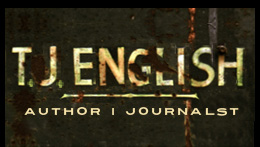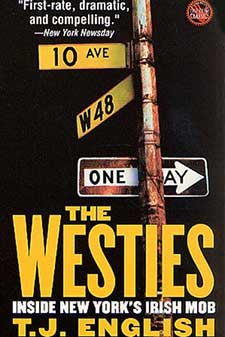Thomas Joseph "T.J." English comes from a large Irish Catholic family of ten brothers and sisters. Early in his writing career, English worked as a freelance journalist in New York City during the day and drove a taxi at night. He often refers to cab driving as a metaphor for what he does as a writer – cruising the streets, interviewing strangers, exploring the unknown, reporting on what he sees and hears from his sojourns in and around the underworld.
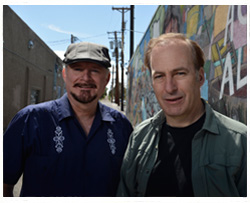
The author with actor Bob Odenkirk,
formerly of Breaking Bad and
current star of Better Call Saul.
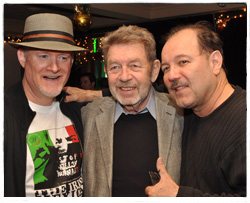
T.J. with legendary journalist Pete Hamill
and salsa singer Ruben Blades.
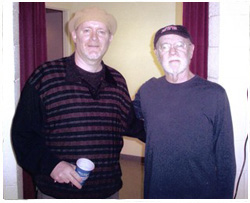
Backstage with George Carlin.
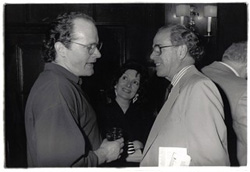
With Pulitzer Prize-winning author
William Kennedy.
In 1990, English published his first book, The Westies, an account of the last of the Irish Mob in the infamous Manhattan neighborhood known as "Hell’s Kitchen." The book was the result of a series of reports English wrote for a weekly Irish American newspaper based in New York.
His second book, Born to Kill (1995), was an unprecedented inside account of a violent Vietnamese gang based in New York’s Chinatown, that operated up and down the East Coast. In 2005, English published Paddy Whacked, a sweeping history of the Irish American gangster in New York, Chicago, Boston, New Orleans, and other U.S. cities. In 2008, English hit bestseller lists with Havana Nocturne, his account of U.S. mobster infiltration of Havana, Cuba in the years before the Revolution swept Fidel Castro into power. The book became something of a publishing phenomenon, rising to #7 on the New York Times bestseller list and also making the following lists: Wall Street Journal, USA Today, San Francisco Chronicle, Los Angeles Times, Boston Globe, Independent Booksellers. Havana Nocturne is currently in development as a major motion picture.
In 2011, English published The Savage City, a blistering account of racial hostilities between the NYPD and the Black Liberation movement in the 1960s and early 1970s. This book also became a New York Times bestseller. Most recently, English published Where the Bodies Were Buried (2015), an in-depth account the Whitey Bulger scandal, with particular emphasis on the universe of corruption in the criminal justice system that helped to make possible the notorious Boston mobster's twenty-year criminal reign.
As a journalist, English has written for many publications including: Esquire, Playboy, New York magazine, The Village Voice, Los Angeles Times Magazine, and the New York Times. In the mid-1990s, he wrote a three-part series for Playboy entitled "The New Mob" that explored the changing face of organized crime in America. More recently, he wrote "Narco Americano," also for Playboy (February 2011), an investigation into the narco war in Mexico and how the violence has effected the Juárez-El Paso borderland. In 2010, his article for Playboy about a DEA agent alleged to have framed innocent people on bogus narcotics charges won the prestigious New York Press Club Award for Best Crime Reporting. These and other articles were published in the book Whitey's Payback (2013), a collection of the author's crime journalism over a twenty-year period.
His work as a writer has taken him to Cuba, Jamaica, Hong Kong, Mexico, Ireland, and all around the U.S... Most of his articles are on the subject of crime and criminal justice, though English writes on a wide variety of subjects including music, politics, and movies. He has published full-length interviews with actor Bill Murray, former Chicago mayor Richard J. Daley, director Martin Scorsese, and comedy legend George Carlin, to name a few.
In addition, English is a screenwriter and has penned episodes for the television crime dramas "NYPD Blue" and "Homicide," for which he was awarded the prestigious Humanitas Prize.
He lives in New York City.
